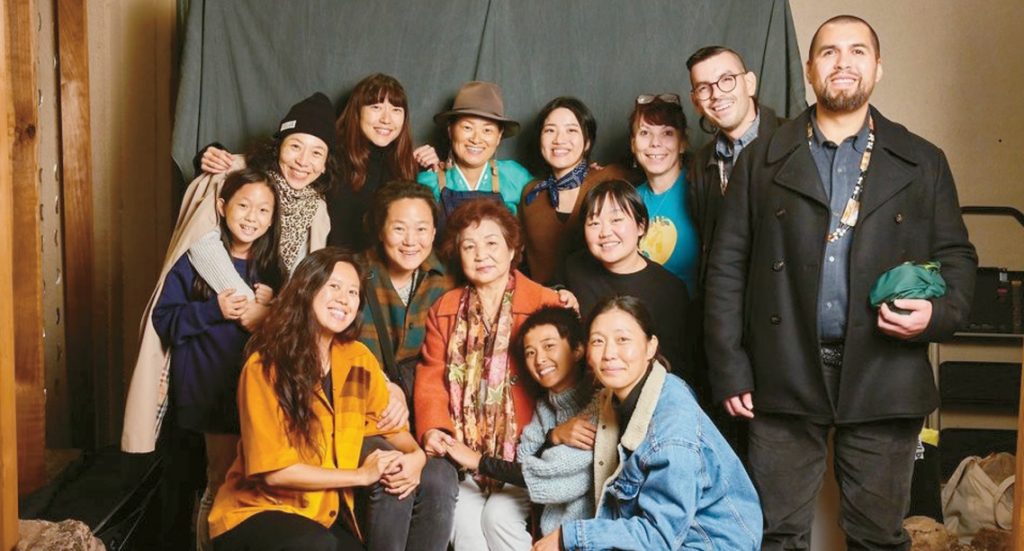
This is the mission of Seed Story, an organization founded by second-generation Korean Americans in Los Angeles and Northern California.
Established in 2021 by landscape designer Hannah Pae, along with Hyunch Sung (Studio Moonya), Ginny Hwang (plant designer), Yoon Ju Ellie Lee (Korean-American artist), and Grace Jiyun Lee (nonprofit community consultant), Seed Story seeks to find connections to today’s culture in the stories of the first generation and preserve them for future generations.
Pae emphasizes the significance of food as a topic that bridges language and generational barriers. “Their stories contain valuable information that may soon be lost, and we want to listen to them, document them, and share them with the next generation and other communities,” says Pae.
To achieve this goal, Seed Story launched the Cultural Memory Project. They conducted in-depth interviews with Korean-American seniors in Los Angeles, San Francisco, and other locations, focusing on their life stories related to food. The stories of the first generation were then illustrated by artists. The resulting texts and illustrations, which resonate with younger generations, have already been published in 10 English-language magazines.
Initially, building rapport during the interviews was a challenge. The team approached the older migrants as if they were their own grandparents, aiming to create a comfortable environment where they could openly share their past experiences. The team allowed ample time for the interviews, patiently waiting until the elders felt comfortable opening up.
Pae explains that Korea’s agricultural background has provided the elderly with interesting stories about the food they consumed as children, some of which are no longer found today. Additionally, some seniors shared stories of hardship, such as memories of Japanese colonization and war, which they hadn’t previously shared with others.
The COVID-19 pandemic played a role in bringing the second-generation Koreans together. During the peak of the pandemic, Pae’s grandmother was living in a nursing home, and family visits were suspended due to language barriers. Sadly, Pae’s grandmother passed away in the nursing home as her health deteriorated.
“Beyond conducting interviews, listening to the elderly was an act of human connection that we were missing from the older generation,” Pae reflects. “Creating a ‘human-to-human’ rapport was one of the goals of this project, aiming to reduce the isolation experienced by the elderly.”
In November, the Seed Story team organized a cultural exchange event between the Ohlone people, a Native American group in Northern California, and Korean seniors. Acorns served as a symbolic medium between the two cultures.
“There are very few cultures in the world that eat acorns, and both the Ohlone people and Koreans share this culinary tradition,” explains Grace Jiyun Lee of Seed Story. “We had a wonderful experience at the Ohlone restaurant, where the chefs served a multi-course meal featuring acorns, including Korean-style acorn jelly.”
Seed Story is also planning an event in Oakland’s Chinatown, collaborating with the Cut Fruit Collective, an Asian-American nonprofit organization, to share stories and food with Korean and Chinese seniors in the community.
Currently, Seed Story shares the stories of Korean American seniors through their website, www.ssiyagi.com. In February, the organization also delivered a lecture at UC Berkeley to share stories of Korean immigrant seniors.
BY YEOL JANG [support@koreadaily.com]

![Son Heung-min to LAFC? Tottenham Star Nears MLS Move Tottenham Hotspur and Korea national team captain Son Heung-min is pictured on March 20. [YONHAP]](https://www.koreadailyus.com/wp-content/uploads/2025/05/0516-SonHeungmin-100x70.jpg)

![‘Squid Game’ S3 Breaks Netflix Record Despite Mixed Reviews A still from the third and final season of Netflix's series ″Squid Game″ (2021-2025) [NETFLIX]](https://www.koreadailyus.com/wp-content/uploads/2025/06/0630-SquidGame-100x70.jpg)
